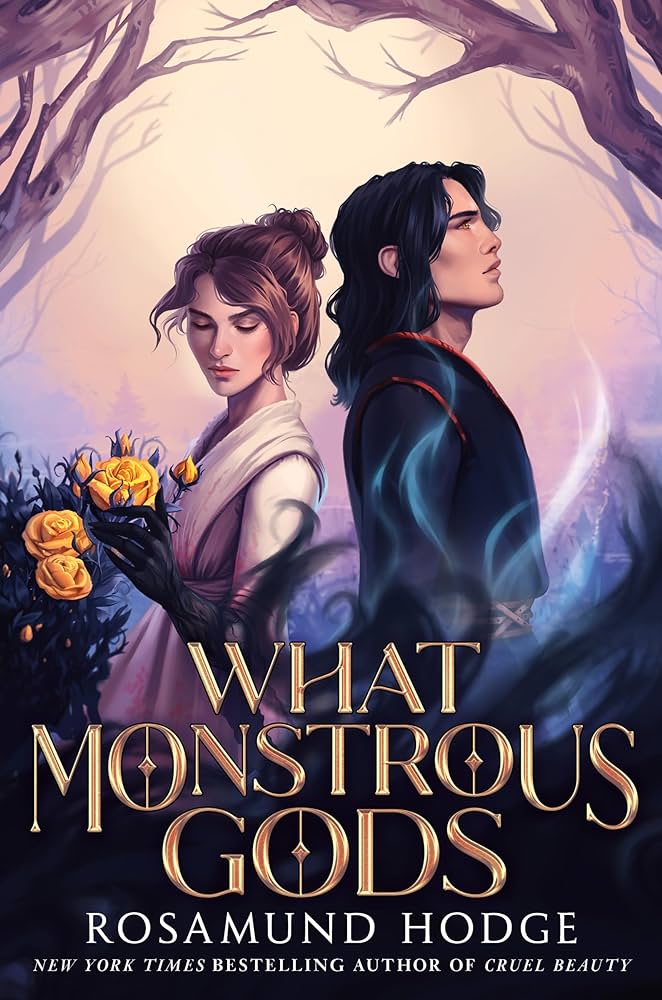Review: What Monstrous Gods by Rosamund Hodge
Category:
Rating:

Introduction:
Centuries ago, the heretic sorcerer Ruven raised a deadly briar around Runakhia’s palace, casting the royal family into an enchanted sleep – and silencing the kingdom’s gods.
Born with a miraculous gift, Lia’s destiny is to kill Ruven and wake the royals. But when she succeeds, she finds her duty is not yet complete, for now she must marry into the royal family and forge a pact with a god – or die.
To make matters even worse, Ruven’s spirit is haunting her.
As discord grows between the old and new guards, the queen sends Lia and Prince Araunn, her betrothed, on a pilgrimage to awaken the gods. But the old gods are more dangerous than Lia ever knew – and Ruven may offer her only hope of survival.
As the two work together, Lia learns that they’re more alike than she expected. And with tensions rising, Lia must choose between what she was raised to believe and what she knows is right – and between the prince she is bound to by duty…and the boy she killed.
Review:
Reviewed by Dakota Watson
What Monstrous Gods started strong. The concept of a Sleeping Beauty-inspired world with its own pantheon of gods was truly fascinating. The author clearly put a lot of thought into crafting the mythology. Unfortunately, that initial spark fizzled out. The world building surrounding the gods felt substantial, but then things fell flat. Take the Royal Gift, for instance. We were told it held immense power, yet when it came to action, it never quite delivered that punch. Lia’s journey through the cursed briar, a pivotal moment in the story, lacked the tension and excitement I craved. It was a lukewarm experience, failing to live up to the promise of the initial hook.
There were bright spots, though. The clash between the deeply religious monarchy and the fiercely secular parliament had potential. It was a simmering pot of conflict, and the author did a decent job of setting it up. However, that potential remained largely untapped. The lack of detail about how these two opposing forces would navigate a newfound shared power struggle left me wanting. I yearned to be truly engrossed in the political intrigue, but without a deeper dive, it all felt a bit surface level.
Ruven was supposed to be this powerful sorcerer, the architect of a kingdom’s slumber, and his downfall? A well placed lap cushion courtesy of Lia. Let’s just say the anti climax left me rolling my eyes. It was undeniably funny, this legendary villain undone by a strategically placed backside. We were primed for an epic showdown, a clash of wills that would test Lia’s power and religious piety. Instead, it all ended rather… unceremoniously.
What further marred the experience was the confusing awakening of the monarchy. We were told they slept for five hundred years, yet they possessed knowledge of their slumber upon waking. Here’s where the story faltered: Did they know of Ruven’s threat before the curse? Was the attack sudden, leaving them with no memory of the past five centuries? If they were aware, how did they come to believe Lia was their savior?
But the biggest letdown for me was Lia herself. Here we have a young woman tasked with the monumental feat of saving a kingdom by killing a supposedly powerful sorcerer. Yet, we never get to see any real training that would equip her for such a burden. Instead, we witness her devout life as a convent novice – filled with prayers and strict vigils. This disconnect left me feeling incredibly sorry for Lia. She was essentially a pawn for those in power, manipulated despite her good intentions. No matter her choices, there was no winning. This aspect, however, did spark a thought provoking theme. The story explores the consequences of killing in the name of a god, especially when the act diminishes the purity required to interact with these very deities. Lia awakens the gods in a kingdom where their power had waned, yet her actions are deemed impure by the very beings she sought to restore. It’s a complex concept that raises interesting questions about faith, sacrifice, and the cost of blind devotion.
Naive and innocent, Lia embodied the wide eyed ingenue, easily swayed by those with cunning agendas. Thrust into the role of savior, Lia’s quest to vanquish a formidable sorcerer felt unearned. We, the readers, were never privy to her transformation – no grueling battles honed her skills, only fervent prayers and the rigid routines of a convent novice. This aspect, however, did spark a thought provoking theme. The story explores the consequences of killing in the name of a god, especially when the act diminishes the purity required to interact with these very deities. Lia awakens the gods in a kingdom where their power had waned, yet her actions are deemed impure by the very beings she sought to restore. It’s a complex concept that raises interesting questions about faith, sacrifice, and the cost of blind devotion.
Ruven, the supposedly powerful sorcerer, wasn’t well developed. While his occasional sarcastic comments as a ghost were mildly amusing, he lacked the depth to be a compelling villain or a MMC. His sudden and unexplained romantic feelings for Lia felt unearned and out of place. Araunn, the other potential love interest, fared no better. His character lacked charisma and the rushed betrothal to Lia felt forced and unnecessary.
All in all, What Monstrous Gods started strong but ultimately left me with more questions than answers. The weak execution overshadowed the potential of the story’s intriguing concepts and promising mythology.
Book Cover:


